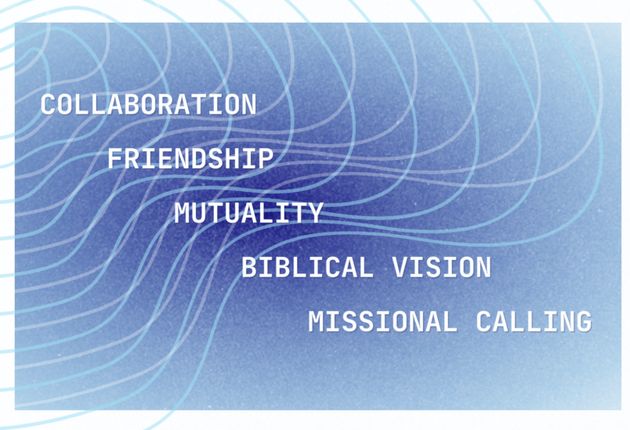Leadership succession and the future of mission
Letting the next generation step up.
15 JANUARY 2025 · 14:06 CET

Two years ago, Queen Elizabeth II died. Her passing was the end of an era, and it broke many records. At almost 71 years on the throne, she was the longest-reigning monarch in British history.
Even so, in her later years there had been continuous calls for her to voluntarily give up the crown in favor of her son. This is understandable: if the previous generation does not divest themselves of the reins of power, the next generation’s time may never come.
When Charles finally acceded the throne, he also broke a record, albeit an unfavorable one. He was the oldest British monarch to ever have been crowned, at age 73.
Generational succession
As I am part of Generation X (born between 1965–1980), I sympathize. The generation before mine, the Baby Boomers, were so named because of a large global birth rate between the years 1946–1964 due to an uptick in global postwar optimism.
This contrasted with the following generation called ‘X’ which actually stood for nothing! Because there were fewer of us, and because we were marked as insignificant, we were overshadowed by our predecessors, and still are.
Boomers are living longer aand retiring later which leaves Gen X questioning if our time will ever come. This has created a domino effect
However, this has created a domino effect. Millennials (born between 1981–1995) and Gen Z (born between 1996–2015) also have been correspondingly delayed in working their way up the professional ladder.
Gen Z have the added burden of facing a world of scarce resources (whether natural resources or jobs or money). They are wanting to skip college because the privilege of taking four years to do a liberal arts degree (and go deep into debt) feels exorbitant to them, and who can blame them?
They would much rather go to a one-year trade school to learn a specific skill, and enter straight into the workforce. Or, they operate on a ‘gig economy’ mentality. Instead of staying in one job for their entire life like Boomers do, or at least doing one job at a time like Gen Xers , they do multiple jobs all at once (Uber driver, Starbucks barista, YouTube content creator, babysitting) and cobble together a paycheck that way.
The influence of parenting
Of course, screens are a big influence as well, but more so on Gen Z than Millennials, because the iPhone was invented in 2007 and Gen Z came of age with smartphones.
This led to an entire generation being parented by screens. Gen X were ‘latchkey kids’ (we raised ourselves independently), Millennials had ‘helicopter parents’ (parents who hovered over their children’s shoulders), and Gen Z have ‘lawnmower/snowplow parents’ (parents who pave the way in front of their children to remove all obstacles so the children do not have to learn to overcome them).
Although Jean Twenge in her book iGen 1 cites screens as the number one influence on Gen Z, Jason Dorsey, from the Center for Generational Kinetics, says that the biggest influence is actually parenting.2
Gen Z have become the ‘anxious generation,’ as they are getting the double force of lawnmower parents plus too much screen time. They are more protected from the physical world but less protected from internet content, leading to a virtual existence.
This leads to developmental delays of up to five years. For example, Gen X generally got their drivers’ licenses on their 16th birthday. Gen Z do not need to learn to drive because their lawnmower parents protect them by doing the driving for them (or, they can just call an Uber via their smartphone), so they generally do not learn to drive until well into their 20s.
Millennials had parents who hovered over their children’s shoulders, and Gen Z have parents who pave the way in front of their children to remove all obstacles so the children do not have to learn to overcome them
However, it is no wonder that today’s college students experience so much anxiety and depression (despite being safer than all previous generations); if they are developmentally delayed five years, they do not have the personal skill set to go off to college on their own yet.
The old proverb of ‘Give a man a fish, you feed him for a day; teach a man to fish, you feed him for a lifetime’ comes to mind. We need to balance our protection of them with teaching them independence.
Parenting is everything (and screens are the symptom, not the problem). Why might some younger generations feel entitled? Because their parents taught them that they deserve it.
Why might some younger generations need trophies just for participation? Because their parents are the ones who gave it to them. Why might some younger generations be addicted to their screens? Because their parents let them have too much screen time.
Why might some younger generations feel anxious about the state of the world? Because their parents handed them a legacy of climate change, racial inequality, unaffordable college tuition, political polarization, obsession about money, and not being trusted to do things themselves.
Why might some younger generations be accused of being fragile? Because they see older generations being just as fragile (eg arguing defensively on social media, or cancel culture on both sides of the political spectrum).
Lausanne and younger leaders
What does this signal to us about the ‘changing of the guard’ with regard to mission leadership? Lausanne has always valued younger leaders, starting from Singapore 1987, the first Younger Leaders’ Gathering (YLG).
I myself was in attendance at the YLG ’06 in Malaysia, and there has since been a YLG ’16 in Indonesia,3 and another one coming up in ’26 (somewhere in Latin America). Each of these has served different generations of rising younger leaders.
If Gen Z is more worried about money, and for good reason, as they are the first generation to make less money than their parents, missions is not something which they will naturally gravitate toward, even if they believe it necessary
Their concern for ROI (Return on Investment) will drive them toward majoring in Business or STEM, and not toward liberal arts or humanities which make little money, and certainly not toward missions which requires fundraising.
The triennial Urbana missions conference (sponsored by InterVarsity) has seen attendance fall from its heyday of 18,000 to 5,000 today.
Wisdom for effective generational succession
The Boomers will not be around forever, and if we do not cultivate the next generation of mission leaders now, it will soon be too late. In light of all of the above, here are some suggestions for leadership succession in missions today:
Share space and trust the younger generations
One of the principal tenets of good leadership is delegation. But the delegation needs to be done not with a paternalistic mindset (‘I am still in charge while you go get the coffee’), but to give them meaningful shared responsibility that matters.
Make the end goal to hand over the reins of power and work yourself out of a job.4 Paul did this with Timothy and exhorted him that youth is not a handicap (1 Tim 4:12).
There are many things that younger generations can do better than older, such as being digital natives, as well as understanding and appreciating diversity. Let them teach us even as we teach them.
Paul in Colossians 3:21 instructs parents not to embitter (ie provoke/exasperate) the younger generation. Malcolm Gladwell famously says that 10,000 hours are required to become truly expert at anything.5 Let us allow the younger generations put in their hours.
Listen well
Do not be dismissive of anybody else’s struggles as inferior. Realize that they have had hard things that we have not had. Each generation needs to sit in, and try to understand, what the others have been through, and be gracious of everyone’s mistakes.
Jonathan Haidt 6 calls for a ceasefire of dichotomous thinking and tribalism which we are all prone to. Aleksandr Solzhenitsyn said it like this: ‘The line separating good and evil passes . . . right through every human heart.’7
In other words, the idea that ‘we are good and the other side is bad’ is not biblical. Rather, God is good and all humans have fallen short of his glory. Having grace with people’s simultaneous good and bad allows for people to learn, and we need to create space for everyone to fail, and these lessons allow them to be built up for future successes.
Intergenerational cooperation 8 is not just mentoring (which can be another form of parenting), it is truly allowing for everyone’s contributions to matter. Paul talks about the analogy of the body, where nobody can say to another ‘I don’t need you’ (1 Cor 12).

Do not silo intergenerational cooperation as its own topic
It really ought to be an element in every discussion. It is not just another brick, it is the mortar between the bricks.
Last year, from 31 May–2 June 2023, I served on the Programme Team to host the Lausanne Generations Conversation (LGC23) 9 at Biola University. The five principles derived from that conversation were shaped like a pyramid: ‘Biblical vision and Missional calling’ are the foundational building blocks; in the middle are ‘Friendship and Mutuality’; and the top is ‘Collaboration’.10
The Fourth Lausanne Congress (L4) in Seoul, held from 22–28 September 2024, is built around the idea of Collaborative Action Teams.
We need to approach the younger generations with a captivating vision of mission
They love diversity, and they hate colonialism. This aligns with what we see in Revelation 7:9 where ‘every nation, tribe, people and language’ is worshipping the Lord which brings glory to God.
But if missions is being marketed to them as ‘the West is right and everyone else is wrong’, it does not take into account that missions today is polycentric, ‘from everyone to everywhere.’11
The gospel also needs to be reframed in fully three dimensions: not just innocence over guilt (save souls), but also honor over shame (save face), and power over fear (save bodies).12 This adds even one extra dimension over the Lausanne Covenant, which only had two dimensions of holistic mission in its original formation (evangelism and social justice).13
As we think about leadership succession in mission today, Lausanne is on the right track. We need to pass on the baton properly to the next missional leaders, so God’s name continues to be glorified throughout the earth and throughout all generations.
Allen Yeh is Dean and VP of Academic Affairs at International Theological Seminary located near Los Angeles. He was formerly Professor of Intercultural Studies and Missiology for 16 years at Biola University.
He earned his BA from Yale, MDiv from Gordon-Conwell, MTh from Edinburgh, and DPhil from Oxford. He is also the author of Polycentric Missiology: 21st Century Mission from Everyone to Everywhere (IVP, 2016), and co-editor (along with Tite Tienou, former Dean of Trinity Evangelical Divinity School) of Majority World Theologies: Theologizing from Africa, Asia, Latin America, and the Ends of the Earth (William Carey, 2018).
This article originally appeared in the November 2024 issue of the Lausanne Global Analysis and is published here with permission. To receive this free bimonthly publication from the Lausanne Movement, subscribe online at www.lausanne.org/analysis.
Endnotes
1. Jean M. Twenge, iGen: Why Today’s Super-Connected Kids Are Growing Up Less Rebellious, More Tolerant, Less Happy—and Completely Unprepared for Adulthood (New York: Atria, 2017).
2. Jason Dorsey and Denise Villa, Zconomy: How Gen Z Will Change the Future of Business—and What to Do About It (New York: Harper Business, 2020).
3. Editor’s note: See ‘Six Leadership Lessons from YLG2016’, by Sarah Breuel and Dave Benson, in Lausanne Global Analysis, November 2016.
4. This was the principle behind 19th-century missiologists Rufus Anderson and Henry Venn’s conception of the ‘three-self church’: wherever Western missionaries go, they ought to ‘work themselves out of a job’ by encouraging the nationals to become: self-governing, self-supporting, and self-propagating. This truly helps to mitigate paternalism.
5. Malcolm Gladwell, Outliers: The Story of Success (New York: Back Bay, 2011).
6. Jonathan Haidt, The Coddling of the American Mind: How Good Intentions and Bad Ideas Are Setting Up a Generation for Failure (New York: Penguin, 2019).
7. Aleksandr Solzhenitsyn,The Gulag Archipelago 1918–1956 (New York: Harper & Row, 1973).
8. For intergenerational leadership, see Micaela Braithwaite, ‘God’s Purpose in Intergenerational Leadership: Why the global church needs intergenerational friendships,’ Lausanne blog, 5 July 2023,.
9. This Lausanne Generations Conversation was intentionally not called a ‘conference’ because we did not just want older people up front talking at the younger people, we wanted table groups where real conversations between different generations was taking place.
10. To unpack the nine principles of LGC23 derived from the five pyramid building blocks:
i)Biblical Vision & Missional Calling (Acts 7:54-9:31): Experienced leaders can bless emerging leaders through encouraging, empowering, and opening doors for them.
ii) Biblical Vision & Missional Calling (Acts 14:8-16:5): God’s global mission is best achieved through intergenerational partnerships, because the mission benefits from what each has to offer.
iii)Intergenerational Friendship: Missional friendships are both side-by-side and outward: intentionally developing relationships and engaging common interests for common goals.
iv)Intergenerational Mutuality: Mutuality is made possible when there is trust, respect, empathy, and reconciliation.
v) Collaborative Leadership: Leaders recognize gifts in others and make space for their development.
vi) Collaborative Leadership: Leaders empower by delegating responsibility with corresponding authority.
vii) Collaborative Leadership: Empowering leaders trust God in those they lead.
viii) Communication in Collaboration: Appreciating what different generations have to offer strengthens collaboration.
ix) Communication in Collaboration: Active listening is central to effective collaboration.
11. Allen Yeh, Polycentric Missiology: 21st-Century Mission from Everyone to Everywhere (Downers Grove: IVP Academic, 2016).
12. Jayson Georges, The 3D Gospel: Ministry in Guilt, Shame, and Fear Cultures (Timē Press, 2017).
13. Mark Matlock, the Director of the triennial Urbana missions conference, tasked me with forming a team of nine missiologists to write three ‘white papers’: Reframe Missions Beyond Colonial Legacies; Redefine Missionary Sending in a Connected Era; Articulate a Theology of the Gospel and Mission for Today’s World. These three white papers will be critical for captivating the younger generations for mission.
Published in: Evangelical Focus - Lausanne Movement - Leadership succession and the future of mission











